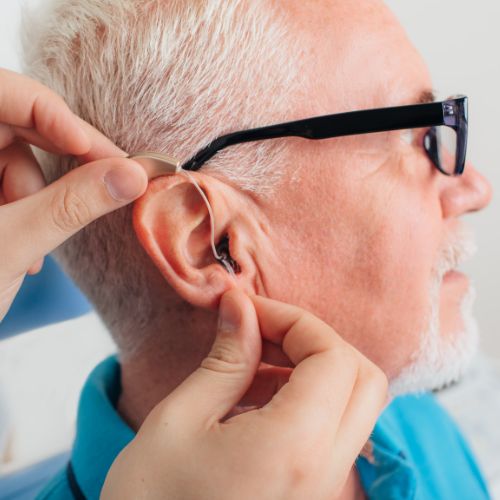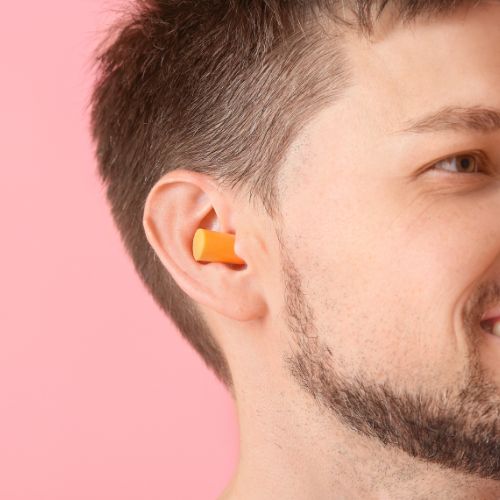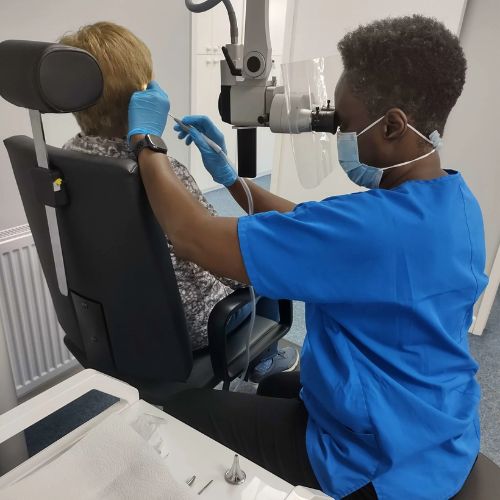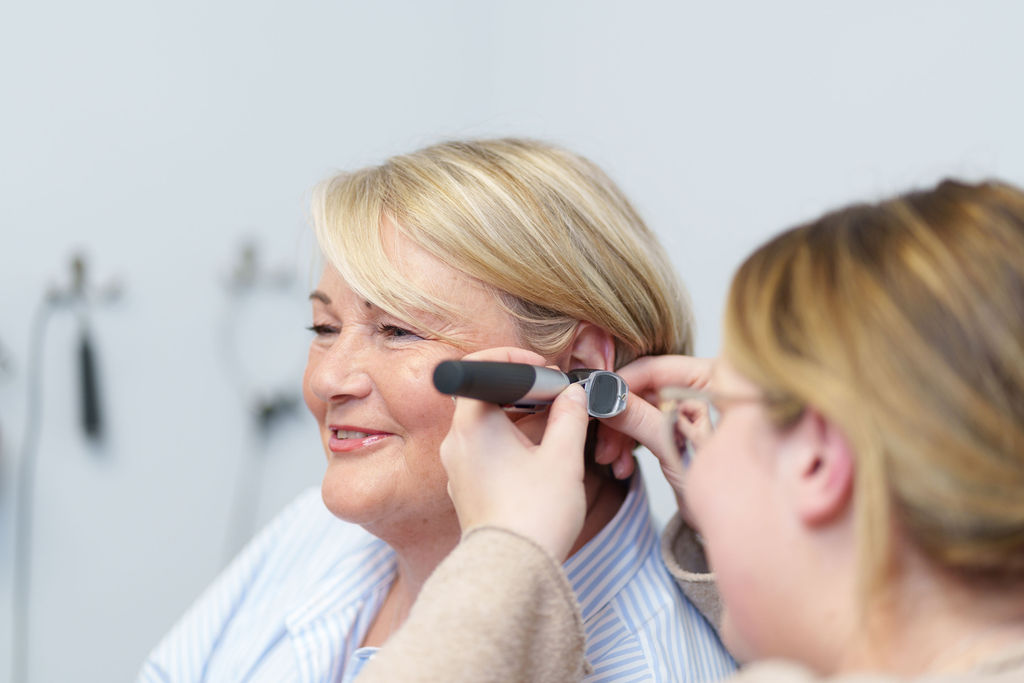Navigating through the day with tinnitus can be overwhelming with the constant noise and ringing in the ears. If you’re grappling with this condition, it’s crucial to know that a range of strategies are at your disposal, and discovering the right mix is vital to regaining control over your auditory environment.
From hearing aids to simple lifestyle adjustments, a spectrum of approaches can bring you relief. Read our guide below to discover the best ways to manage tinnitus.
At South East Hearing Care Centres, we support you throughout your hearing journey. If you think you’re suffering from tinnitus, book a hearing consultation at one of our clinics today.
Understanding tinnitus
Definition and symptoms
Tinnitus is a common condition where you hear noises or ringing in your ears when there’s no external sound. It can stem from various factors, including age-related hearing loss, exposure to loud noises, or even stress. Symptoms vary widely; you might hear ringing, buzzing, or hissing sounds nobody else can hear. These can be constant or intermittent, significantly impacting your quality of life. Learning how to manage tinnitus is crucial. While figuring out how to cure tinnitus entirely might not always be possible, strategies exist to stop tinnitus from dominating your life.
Medical treatment options for tinnitus relief
If you’re struggling with tinnitus, there are medical treatments that can help you find relief.
Hearing aids
For many experiencing tinnitus alongside hearing loss, hearing aids can significantly alleviate symptoms by amplifying external sounds. These devices improve your ability to hear ambient noises and reduce the prominence of tinnitus by bringing more environmental sounds into focus. Here’s how hearing aids can enhance your quality of life:
- Enhances speech understanding: Makes conversations clearer, reducing the strain of listening.
- Reduces tinnitus perception: Amplifying background noise lessens the focus on tinnitus.
- Improves social interactions: You’ll feel more confident in social settings.
- Increases awareness: Helps in better navigation of your environment.
- Promotes a better quality of life: Overall, it leads to a more active and fulfilling life despite tinnitus.

Sound therapy
Sound therapy often relieves individuals suffering from tinnitus by utilising white noise machines and specialised apps to reduce unwanted auditory sensations. These tools generate soothing sounds, like rainfall or ocean waves, which can mask the ringing, buzzing, or hissing sounds of tinnitus. You’ll find that incorporating sound therapy into your daily routine can significantly diminish your focus on tinnitus, thereby reducing its impact on your life.
Cognitive Behavioural Therapy (CBT)
Cognitive Behavioural Therapy (CBT) often effectively changes how you respond emotionally to tinnitus, offering significant relief. This therapy focuses on altering negative thought patterns and behaviours associated with your condition. By working with a trained therapist, you’ll learn strategies to cope better with the distress tinnitus can cause.
CBT doesn’t eliminate the noise but helps you manage your reaction to it, reducing its impact on your life. You’ll practise techniques to divert your attention from tinnitus and towards more positive activities.
Self-help strategies for tinnitus management
Incorporating mindfulness and relaxation techniques can significantly reduce your symptoms, and making lifestyle changes and protecting your hearing are essential steps to prevent exacerbation.
Mindfulness and relaxation techniques
Incorporating mindfulness and relaxation techniques into your daily routine can significantly alleviate the stress that often aggravates tinnitus symptoms. These strategies help you focus on the present moment, reducing the impact of the loud noise in your ears. By adopting a regular practice, you’ll find your symptoms becoming less intrusive over time.
- Mindful breathing: Focus on your breath to anchor yourself in the present moment.
- Progressive muscle relaxation: Tense and then relax each muscle group to release physical stress.
- Guided imagery: Visualise a peaceful scene to divert attention from tinnitus.
- Yoga: Combine physical postures, breathing exercises, and meditation to reduce stress.
- Body scan meditation: Pay attention to each body part to identify and release tension.

Lifestyle changes
Exploring lifestyle changes can further assist in managing tinnitus effectively. You’ll find that incorporating a healthy diet and regular exercise into your routine boosts your overall well-being and alleviates some tinnitus symptoms.
It’s equally important to identify and steer clear of triggers known to make tinnitus worse. Common culprits include loud noises and caffeine, so limit your exposure to these as much as possible.
Protecting your hearing

To effectively manage tinnitus, it’s crucial to prioritise hearing protection, including wearing earplugs in noisy settings. This proactive approach helps manage your current symptoms and prevent the potential worsening of your condition.
- Use earplugs or earmuffs in environments where noise levels are elevated, such as concerts or construction sites.
- Keep the volume down on personal audio devices.
- Choose noise-cancelling headphones over traditional earbuds to reduce the need for higher volume settings.
- Give your ears regular breaks in quiet environments to recover from exposure to loud noises.
- Book regular hearing tests to monitor your hearing health and adjust your protection strategies.
Book an appointment for a hearing consultation
Don’t let tinnitus control your life. Booking your hearing consultation is a significant step towards treating tinnitus and improving your ear health. Book an appointment with our team and experience:
- Personalised Care: Each case of tinnitus is unique. A consultation ensures you receive tailored advice and treatments.
- Expert Diagnosis: Our HCPC-registered audiologists use their expertise and state-of-the-art equipment to pinpoint the cause of your tinnitus.
- Cutting-edge Technology: You’ll have access to a wide range of modern hearing aids, including advanced features like Bluetooth connectivity.
- Comprehensive Support: Beyond the initial consultation, you’ll find a community ready to support you through your journey with tinnitus.
- Peace of Mind: Knowing you’re in the hands of experts with 25 years of experience provides relief and confidence in managing your condition.

Frequently Asked Questions
Can Tinnitus Go Away?
Tinnitus can go away on its own, especially if short-term factors like exposure to loud noises cause it. However, for some, it might persist and require treatment to manage symptoms effectively.
How Can I Reduce Tinnitus Naturally?
To reduce tinnitus naturally, you should try using white noise machines, limiting alcohol, caffeine, and nicotine, practising relaxation techniques like deep breathing and yoga, listening to soft music, and considering joining a support group.
What Is the Most Effective Treatment for Tinnitus?
The most effective treatment varies, but combining hearing aids, sound therapy, counselling, and self-help techniques yields the best results.
